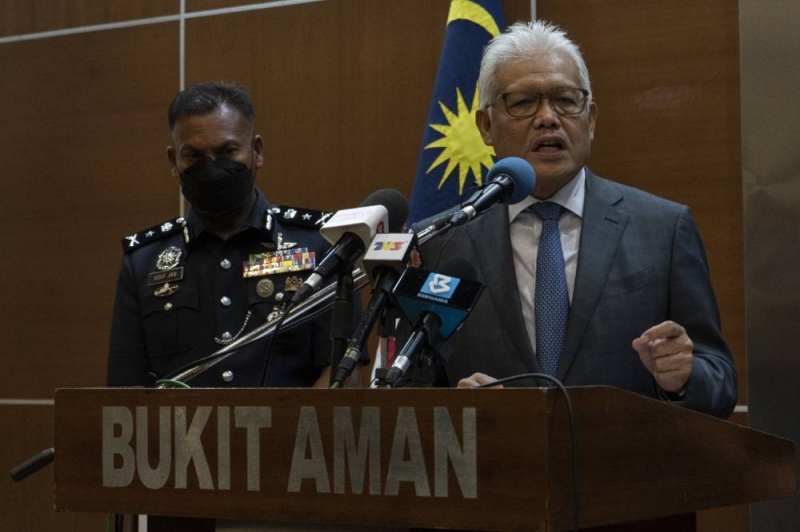
Home Minister Datuk Seri Hamzah Zainudin (right) had tabled the IPCC Bill that has been criticised as being toothless in providing oversight towards police's conduct. — Picture by Shafwan Zaidon
Tuesday, 26 Jul 2022 8:11 PM MYT
KUALA LUMPUR, July 26 -- The highly controversial Independent Police Conduct Commission (IPCC) Bill 2020 has been passed in Parliament after being tabled by Home Minister Datuk Seri Hamzah Zainuddin for its second reading today.
The Bill has been stuck in limbo for almost two years up to today, despite numerous meetings since — making it the only Bill that was not passed from two concluded Parliament sittings.
Dewan Rakyat Speaker Tan Sri Azhar Azizan Harun called for an immediate third reading after minimal objections were put forward against the Bill, which was then passed via a majority voice vote.
The IPCC Bill was tabled for its first reading in the Dewan Rakyat by then Deputy Home Minister Datuk Seri Ismail Mohamed Said in August 2020.
The IPCC Bill was introduced to replace the Independent Police Complaints and Misconduct Commission (IPCMC) Bill that was tabled in Parliament by the Pakatan Harapan (PH) government in 2019.
The decision to replace the Bill was made following the change in government in March 2020, with many criticising the new Bill as a watered-down version of the IPCMC.
The IPCMC Bill had proposed that "the Commission may initiate investigations notwithstanding anything to the contrary in this Act, the Commission may commence an investigation on its own initiative but only if the Commission is satisfied that the subject matter of the investigation is of significant interest to the public or that it is in the public interest to do so whether or not there is a complaint of misconduct relating to it”.
With the IPCC, however, all complaints to the commission following investigations by its members would then be submitted to a complaints committee.
The findings and recommendations by the complaints committee can either be forwarded to relevant agencies such as the Malaysian Anti-Corruption Commission (MACC) or the commission could direct a task force to carry out further investigations.
Other recommendations removed under the IPCC include suggested disciplinary jurisdiction over any misconduct committed by any member of the police force and the powers to exercise disciplinary jurisdiction over any complaint concerning the misconduct of any member of the police force.
Yesterday, the Malaysian chapter of human rights watchdog Amnesty International warned Malaysians that the IPCC Bill will shield police officers from scrutiny and independent oversight if passed.
It added that the IPCC will further weaken the already inadequate oversight mechanism, the Enforcement Agency Integrity Commission (EAIC), when Malaysia is in desperate need of an independent commission overseeing the police.
Tuesday, 26 Jul 2022 8:11 PM MYT
KUALA LUMPUR, July 26 -- The highly controversial Independent Police Conduct Commission (IPCC) Bill 2020 has been passed in Parliament after being tabled by Home Minister Datuk Seri Hamzah Zainuddin for its second reading today.
The Bill has been stuck in limbo for almost two years up to today, despite numerous meetings since — making it the only Bill that was not passed from two concluded Parliament sittings.
Dewan Rakyat Speaker Tan Sri Azhar Azizan Harun called for an immediate third reading after minimal objections were put forward against the Bill, which was then passed via a majority voice vote.
The IPCC Bill was tabled for its first reading in the Dewan Rakyat by then Deputy Home Minister Datuk Seri Ismail Mohamed Said in August 2020.
The IPCC Bill was introduced to replace the Independent Police Complaints and Misconduct Commission (IPCMC) Bill that was tabled in Parliament by the Pakatan Harapan (PH) government in 2019.
The decision to replace the Bill was made following the change in government in March 2020, with many criticising the new Bill as a watered-down version of the IPCMC.
The IPCMC Bill had proposed that "the Commission may initiate investigations notwithstanding anything to the contrary in this Act, the Commission may commence an investigation on its own initiative but only if the Commission is satisfied that the subject matter of the investigation is of significant interest to the public or that it is in the public interest to do so whether or not there is a complaint of misconduct relating to it”.
With the IPCC, however, all complaints to the commission following investigations by its members would then be submitted to a complaints committee.
The findings and recommendations by the complaints committee can either be forwarded to relevant agencies such as the Malaysian Anti-Corruption Commission (MACC) or the commission could direct a task force to carry out further investigations.
Other recommendations removed under the IPCC include suggested disciplinary jurisdiction over any misconduct committed by any member of the police force and the powers to exercise disciplinary jurisdiction over any complaint concerning the misconduct of any member of the police force.
Yesterday, the Malaysian chapter of human rights watchdog Amnesty International warned Malaysians that the IPCC Bill will shield police officers from scrutiny and independent oversight if passed.
It added that the IPCC will further weaken the already inadequate oversight mechanism, the Enforcement Agency Integrity Commission (EAIC), when Malaysia is in desperate need of an independent commission overseeing the police.
No comments:
Post a Comment